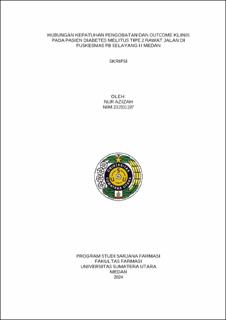Hubungan Kepatuhan Pengobatan dan Outcome Klinis pada Pasien Diabetes Melitus Tipe 2 Rawat Jalan di Puskesmas PB Selayang II Medan
Relationship Between Adherence and Clinical Outcome in Type 2 Diabetes Mellitus Outpatient at PB Selayang II Health Center Medan

Date
2024Author
Azizah, Nur
Advisor(s)
Nasution, Embun Suci
Novriani, Erida
Metadata
Show full item recordAbstract
Background: Diabetes mellitus is a chronic disease that requires long-term
treatment which adherence will result in good clinical outcome.
Objective: To determine the level of adherence and clinical outcome, different tets
in patient’s characteristics with adherence and clinical outcome as well as the
relationship between adherence and clinical outcome in type 2 diabetes mellitus
outpatient at the PB Selayang II health center Medan.
Method: Descriptive cross-sectional study that used Medication Adherence Rating
Scale-5 (MARS-5) questionnaire and clinical outcome data from fasting blood
glucose and Body Mass Index (BMI). This research was conducted form August to
December 2023.
Results: From the results of the study, 90 patients were obtained, 35 of whom
refused to be respondents (respondent rate 72%), the majority of patients was
woman (55.6%); aged 56-65 years (41.1%); bachelor (46.7%), unemployed
(65.6%), duration of illness >5 years (48.9%); and had comorbidities (54.4%). The
majority the level of adherence was non-adherence (58.9%) with uncontrolled
fasting blood glucose (56.7%) and BMI was normal (51.1%). The Kruskal-Wallis
test showed that only age had a significant difference with fasting blood glucose.
The chi-square test showed that there was no significant relationship between the
level of adherence and clinical outcome.
Conclusion: The majority of adherence’s was non-adherence with uncontrolled
fasting blood glucose and BMI was normal. Only age characteristic had significant
different with fasting blood glucose. There was no significant relationship between
adherence and clinical outcome.
Collections
- Undergraduate Theses [1834]
